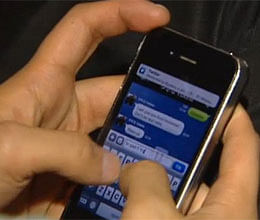
Text messages can help predict which teens are likely to engage in bad behaviour, scientists have found. Researchers from the University of Texas at Dallas have found a correlation between the frequency with which adolescents text about antisocial behaviours and the likelihood that they will engage in them.
"We were interested in how adolescents use electronic communication, particularly text messaging," said Dr Samuel Ehrenreich, post-doctoral researcher in the School of Behavioural and Brain Sciences at UT Dallas.
"We examined how discussing antisocial behaviour - substance abuse, property crimes, physical aggression, that sort of thing how discussing that predicts actually engaging in this problem behaviour. Basically, does talking about bad behaviour predict bad behaviour?" he said.
Although the idea of studying the texting habits of teens may not be new, looking directly at the messages they are sending is. Past studies relied on self-reported texting behaviours, which Ehrenreich said may be flawed due to teens providing inaccurate information about texts. They would not likely self-report texting about misbehaviour.
Teens also send an average of 60-100 texts per day, so they may simply forget about much of the texting they do. To circumvent these problems, free BlackBerry devices and service plans were given to 172 ninth-grade students with the understanding that their texts would be monitored.
Texts were collected and stored offsite in a secure database. The participants were rated before and after the school year for rule breaking and aggressive behaviour by parents, teachers and in self reports.
Analysis of a sample of texts from two points in time revealed similarities in the types of antisocial messages between boys and girls. These included discussions of rule-breaking, illicit substance use, physical aggression or property crimes.
Overall, the rate of antisocial texts was small, at less than 2 per cent of the total messages sent and received.
"We were interested in how adolescents use electronic communication, particularly text messaging," said Dr Samuel Ehrenreich, post-doctoral researcher in the School of Behavioural and Brain Sciences at UT Dallas.
"We examined how discussing antisocial behaviour - substance abuse, property crimes, physical aggression, that sort of thing how discussing that predicts actually engaging in this problem behaviour. Basically, does talking about bad behaviour predict bad behaviour?" he said.
Although the idea of studying the texting habits of teens may not be new, looking directly at the messages they are sending is. Past studies relied on self-reported texting behaviours, which Ehrenreich said may be flawed due to teens providing inaccurate information about texts. They would not likely self-report texting about misbehaviour.
Teens also send an average of 60-100 texts per day, so they may simply forget about much of the texting they do. To circumvent these problems, free BlackBerry devices and service plans were given to 172 ninth-grade students with the understanding that their texts would be monitored.
Texts were collected and stored offsite in a secure database. The participants were rated before and after the school year for rule breaking and aggressive behaviour by parents, teachers and in self reports.
Analysis of a sample of texts from two points in time revealed similarities in the types of antisocial messages between boys and girls. These included discussions of rule-breaking, illicit substance use, physical aggression or property crimes.
Overall, the rate of antisocial texts was small, at less than 2 per cent of the total messages sent and received.








